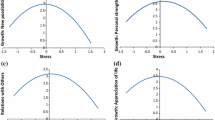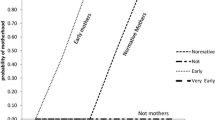Abstract
Using a longitudinal design, the current study aimed to extend previous research by exploring three questions concerning the mechanism underlying the process of mothers’ personal growth in the aftermath of a premature birth: Are the positive changes reported previously by women who gave birth prematurely long-lasting and salient 4 years post-partum? Does the degree of change in maternal mental health over time predict personal growth 4 years after childbirth? Does the change in maternal mental health mediate between premature birth and personal growth 4 years later? Mental health was examined in four assessment waves: 1 month, and 1, 2, and 4 years after childbirth. Personal growth was tapped in the last wave. Data were collected from 561 Israeli mothers. The findings reveal that mothers who gave birth prematurely report higher personal growth 4 years after childbirth than mothers who delivered at full-term. Moreover, higher initial mental health and greater improvement in mental health over time predicted higher personal growth. In addition, the higher personal growth shown by women who gave birth prematurely was explained by their greater improvement in mental health over time than women who delivered at full-term. Finally, more highly educated and multiparous women reported an increase in mental health over time, which, in turn was associated with higher personal growth. Theoretical and clinical implications are discussed.

Similar content being viewed by others
References
Aldwin, C. M., & Levenson, M. R. (2004). Posttraumatic growth: A developmental perspective. Psychological Inquiry, 15, 19–92.
Barr, P. (2011). Posttraumatic growth in parents of infants hospitalized in a neonatal intensive care unit. Journal of Loss and Trauma, 16, 134–2011.
Barskova, T., & Oesterreich, R. (2009). Post-traumatic growth in people living with a serious medical condition and its relations to physical and mental health. Disability and Rehabilitation, 31, 1709–1733.
Baum, N., Weidberg, Z., Osher, Y., & Kohelet, D. (2012). No longer pregnant, not yet a mother: Giving birth prematurely to a very-low-birth-weight baby. Qualitative Health Research, 22, 595–606.
Bollen, K. A., & Curran, P. J. (2006). Latent curve models: A structural equation perspective. Hoboken, NJ: Wiley.
Brandon, D. H., Tully, K. P., Silva, S. G., Malcolm, W. F., Murtha, A. P., Turners, B. S., et al. (2011). Emotional response of mothers of late-preterm and term infants. Journal of Obstetric, Gynecologic, and Neonatal Nursing, 40, 719–731.
Burchinal, M., Nelson, L., & Poe, M. (2006). Growth curve analysis: An introduction to various methods for analyzing longitudinal data. Monographs of the Society for Research in Child Development, 71, 65–87.
Calhoun, L. G., Cann, A., Tedeschi, R. G., & McMillan, J. (2000). A correlational test of the relationship between posttraumatic growth, religion, and cognitive processing. Journal of Traumatic Stress, 13, 521–527.
Cowan, P. A., & Cowan, C. P. (2000). When partners become parents: The big life change for couples. Hillsdale, NJ: Erlbaum.
Danhauer, S. C., Case, L. D., Tedeschi, R., Russell, G., Vishnevsky, T., Triplett, K., et al. (2013). Predictors of posttraumatic growth in women with breast cancer. Psycho-Oncology, 22, 2676–2683.
Davis, L., Edwards, H., Mohay, H., & Wollin, J. (2003). The impact of very premature birth on the psychological health of mothers. Early Human Development, 73, 61–70.
Dekel, S., Ein-Dor, T., & Solomon, Z. (2012). Posttraumatic growth and posttraumatic distress: A longitudinal study. Psychological Trauma: Theory, Research, Practice, and Policy, 4, 94–101.
Enders, C. K. (2010). Applied missing data analysis. London: Guilford.
Goldberg, D., & DiVitto, B. (2002). Parenting children born preterm. In M. H. Bornstein (Ed.), Handbook of parenting (pp. 329–354). Mahwah, NJ: Erlbaum.
Goodman, S. H., Rouse, M. H., Connell, A. M., Robbins Broth, M., Hall, C. M., & Heyward, D. (2011). Maternal depression and child psychopathology: A meta-analytic review. Clinical Child and Family Psychology Review, 14, 1–27.
Grouleau, J. M., Calhoun, L. G., & Tedeschi, R. G. (2013). The role of centrality of events in posttraumatic distress and posttraumatic growth. Psychological Trauma: Theory, Research, Practice, and Policy, 5, 477–483.
Helgeson, V. S., Reynolds, K. A., & Tomich, P. L. (2006). A meta-analytic review of benefit finding and growth. Journal of Consulting and Clinical Psychology, 74, 797–816.
Johnson, S. F., & Boals, A. (2015). Refining or ability to measure posttraumatic growth. Psychological Trauma: Theory, Research, Practice, and Policy, 7, 422–429.
Joseph, L. (2012). What doesn’t kill us: The new psychology of posttraumatic growth. New York: Perseus Group.
Lupton, D., & Fenwick, J. (2001). “They’ve forgotten that I’m a mum”: Constructing and practicing motherhood in special care nurseries. Social Sciences & Medicine, 53, 1011–1021.
McFarland, C., & Alvaro, C. (2000). The impact of motivation on temporal comparisons: Coping with traumatic events by perceiving personal growth. Journal of Personality and Social Psychology, 70, 327–343.
Noy, A., Taubman – Ben-Ari, O., & Kuint, J. (2015). Well-being and personal growth in mothers of full-term and pre-term singletons and twins. Stress and Health, 31, 365–372.
Park, C. L. (2004). The notion of growth following stressful life experiences: Problems and prospective. Psychological Inquiry, 15, 69–76.
Poehlmann, J., Schwichtenberg, M., Bolt, D., & Dilworth-Bart, J. (2009). Predictors of depressive symptom trajectories in mothers of preterm or low birth weight infants. Journal of Family Psychology, 23, 690–704.
Porat-Zyman, G., Taubman – Ben-Ari, O., Morag, I., & Kuint. J. (2018). Maternal mental health over the course of four years following childbirth: The contribution of birth circumstances and psycho-social factors. Women & Health, 58, 72–91.
Porat-Zyman, G., Taubman – Ben-Ari, O., & Spielman, V. (2017). Dyadic transition to parenthood: A longitudinal assessment of personal growth among parents of pre- and full-term infants. Stress & Health, 33, 24–34.
Rozen, G., Taubman – Ben-Ari, O., Strauss, T., & Morag, I. (2017). Personal growth of mothers of preterms: Objective severity of the event, subjective stress, personal resources, and maternal emotional support. Journal of Happiness Studies. https://doi.org/10.1007/s10902-017-9915-5
Sawyer, A., & Ayers, S. (2009). Post-traumatic growth in women after childbirth. Psychology and Health, 24, 457–471.
Sawyer, A., Ayers, S., & Field, A. P. (2010). Posttraumatic growth and adjustment among individuals with cancer or HIV/AIDS: A meta-analysis. Clinical Psychology Review, 30, 436–447.
Sawyer, A., Ayers, S., Young, D., Bradley, R., & Smith, H. (2012). Posttraumatic growth after childbirth: A prospective study. Psychology and Health, 27, 362–377.
Selig, J. P., & Preacher, K. J. (2009). Mediation models for longitudinal data in developmental research. Research in Human Development, 6, 144–164.
Shakespeare-Finch, J., & Enders, T. (2008). Corroborating evidence of posttraumatic growth. Journal of Traumatic Stress, 21, 421–424.
Spielman, V., & Taubman – Ben-Ari, O. (2009). Parental self-efficacy and personal growth in the transition to parenthood: A comparison between parents of premature and full-term babies. Health and Social Work, 34, 201–222.
Spinelli, M., Frigerio, A., Montali, L., Fasolo, M., Spada, M. S., & Mangili, G. (2016). “I still have difficulties feeling like a mother”: The transition to motherhood of preterm infants mothers. Psychology & Health, 31, 184–204.
Taubman – Ben-Ari, O. (2012). Becoming and developing: Personal growth in the wake of parenthood and grandparenthood. In P. R. Shaver & M. Mikulincer (Eds.), Meaning, mortality, and choice: The social psychology of existential concerns. Washington, D.C.: APA.
Taubman – Ben-Ari, O., Ben Shlomo, S., & Findler, L. (2012). Personal growth and meaning in life among first-time mothers and grandmothers. Journal of Happiness Studies, 13, 801–820.
Taubman – Ben-Ari, O., Findler, L., & Kuint, J. (2010). Personal growth in the wake of stress: The case of mothers of pre-term twins. The Journal of Psychology: Interdisciplinary and Applied, 144, 185–204.
Taubman – Ben-Ari, O., Findler, L., & Sharon, N. (2011). Personal growth in mothers: Examination of the suitability of the posttraumatic growth inventory as a measurement tool. Women and Health, 51, 604–622.
Taubman – Ben-Ari, O., & Spielman, V. (2014). Personal growth of parents two years after the birth of the first child: A comparison of parents of pre- and full-term babies. Social Work Research, 38, 91–106.
Tedeschi, R. G., & Calhoun, L. G. (1996). The posttraumatic growth inventory: Measuring the positive legacy of trauma. Journal of Traumatic Stress, 9, 455–471.
Tedeschi, R. G., & Calhoun, L. G. (2004). Posttraumatic growth: Conceptual foundations and empirical evidence. Psychological Inquiry, 15, 1–18.
Triplett, K. N., Tedeschi, R. G., Cann, A., Calhoun, L. G., & Reeve, C. L. (2012). Posttraumatic growth, meaning in life, and life satisfaction in response to trauma. Psychological Trauma: Theory, Research, Practice, and Policy, 4, 400–410.
Veit, C. T., & Ware, E. (1983). The structure of psychological stress and well-being in general populations. Journal of Consulting and Clinical Psychology, 51, 730–742.
Vigod, S., Villegas, L., Dennis, C.-L., & Ross, L. (2010). Prevalence and risk factors for postpartum depression among women with preterm and low-birth-weight infants: A systematic review. BGOG, 117, 540–550.
Wang, J., & Wang, X. (2012). Structural equation modeling applications using Mplus. West Sussex: Higher Education.
Wu, Y. P., Selig, J. P., Roberts, M. C., & Steele, R. G. (2011). Trajectories of postpartum maternal depressive symptoms and children’s social skills. Journal of Child and Family Studies, 20, 414–423.
Author information
Authors and Affiliations
Corresponding author
Rights and permissions
About this article
Cite this article
Porat-Zyman, G., Taubman – Ben-Ari, O., Kuint, J. et al. Personal Growth 4 Years After Premature Childbirth: The Role of Change in Maternal Mental Health. J Happiness Stud 20, 1739–1750 (2019). https://doi.org/10.1007/s10902-018-0012-1
Published:
Issue Date:
DOI: https://doi.org/10.1007/s10902-018-0012-1




